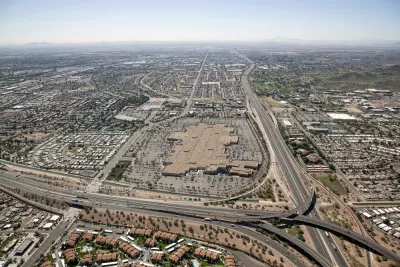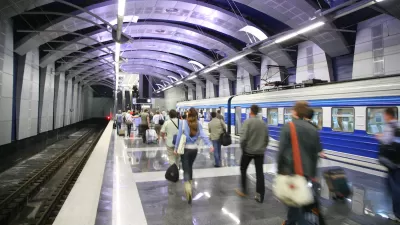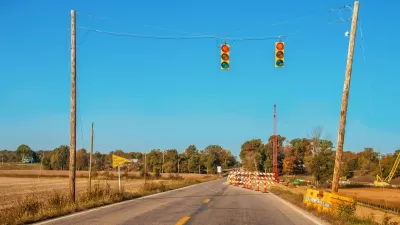It's a vicious cycle: highways enable white flight, establishing a power base for a political party opposed to urban transportation systems.

An article by Melissa de Witte introduces The Road to Inequality: How the Federal Highway Program Polarized America and Undermined Cities, a new book by Clayton Nall.
The main premise of the book: that the federal highway program of the 1950s enabled residential migration at a scale that polarized the nation between liberal cities and more conservative suburban areas. "In turn, this polarization created partisan differences about how to implement transportation policy – think highways, mass transit and trains – in communities across the country," writes de Witte.
The bulk of the article is devoted to an interview with Nall, with a conversation that delves into the inspiration for the book, myths of transportation policy, and the stakes for the country in the ongoing political debate about how the nation prioritizes transportation investments.
FULL STORY: Federal highway program led to inequality and polarization, according to Stanford researcher

Planetizen Federal Action Tracker
A weekly monitor of how Trump’s orders and actions are impacting planners and planning in America.

Congressman Proposes Bill to Rename DC Metro “Trump Train”
The Make Autorail Great Again Act would withhold federal funding to the system until the Washington Metropolitan Area Transit Authority (WMATA), rebrands as the Washington Metropolitan Authority for Greater Access (WMAGA).

DARTSpace Platform Streamlines Dallas TOD Application Process
The Dallas transit agency hopes a shorter permitting timeline will boost transit-oriented development around rail stations.

Renters Now Outnumber Homeowners in Over 200 US Suburbs
High housing costs in city centers and the new-found flexibility offered by remote work are pushing more renters to suburban areas.

The Tiny, Adorable $7,000 Car Turning Japan Onto EVs
The single seat Mibot charges from a regular plug as quickly as an iPad, and is about half the price of an average EV.

Supreme Court Ruling in Pipeline Case Guts Federal Environmental Law
The decision limits the scope of a federal law that mandates extensive environmental impact reviews of energy, infrastructure, and transportation projects.
Urban Design for Planners 1: Software Tools
This six-course series explores essential urban design concepts using open source software and equips planners with the tools they need to participate fully in the urban design process.
Planning for Universal Design
Learn the tools for implementing Universal Design in planning regulations.
Municipality of Princeton
Roanoke Valley-Alleghany Regional Commission
City of Mt Shasta
City of Camden Redevelopment Agency
City of Astoria
Transportation Research & Education Center (TREC) at Portland State University
US High Speed Rail Association
City of Camden Redevelopment Agency
Municipality of Princeton (NJ)





























